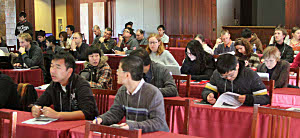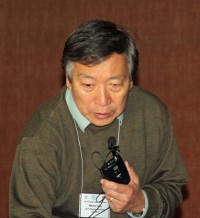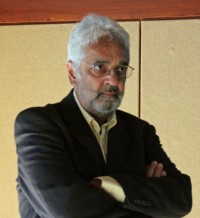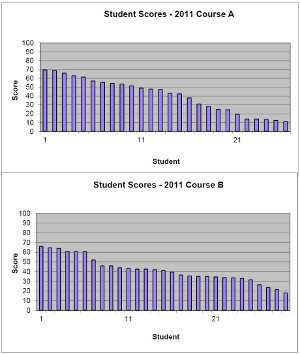
Students in the lecture hall at Asilomar Conference Center in Pacific Grove, California, US. Image: ILC
The Sixth International Accelerator School for Linear Colliders was held from 6 to 17 November last year at the Asilomar Conference Center in Pacific Grove, California, US. This highly selective and successful school series began in 2006 in Japan and has rotated between America, Europe and Asia in subsequent years. The school has an in-depth approach, concentrating on topical areas at the forefront of the field in developing future-generation linear colliders, especially those involved for the ILC. A significant number of students have gone on to work in the field.
In 2006, Weiren Chou of Fermilab approached me with the idea of organising an advanced accelerator school based on linear collider accelerator science. He argued that most universities do not have a PhD programme in accelerator physics, so that when accelerator physicists make a career switch, they usually receive in-field mentoring at a large accelerator laboratory. Although there are already other very good accelerator schools that provide additional academic instruction, Weiren suggested that our school should be rigourous and focus on real leading-edge issues for a linear collider, especially the ILC, and be taught by the experts dealing with those problems.
I bought into this idea, not without some selfish hope that this would help facilitate bringing new very good young physicists into the challenging problems we face in developing a linear collider that can achieve our challenging and ambitious goals. The rest is history.
The school has been very popular, bringing in hundreds of qualified applicants each year for our limited capacity of 60 to 70 students, enabling us to be highly selective. We have evolved the school over the six years to include related topics, such as the Compact Linear Collider Study (CLIC) and a muon collider, while at the same time keeping our in-depth philosophy by dividing the curriculum into two tracks.
Weiren Chou and Alex Chao (SLAC) have, along with the local organisers and very capable administrative support from Fermilab, worked together as a team to oversee and organise the school. This year the local organisers were Vinod Bharadwaj (SLAC, chair), Naomi Nagahashi (SLAC, administration) and Nick Arias (SLAC), who provided technical support. The facilities at Asilomar are excellent, not to mention a beautiful venue.
I was pleased to again give the opening day lectures, kicking off with a general introduction to particle physics and the role of particle accelerators in the morning, followed by an introduction to the International Linear Collider, including the physics motivation and goals and related accelerator and detector concepts. On the second day were excellent introductions to CLIC by Frank Tecker (CERN) and to muon colliders by Robert Palmer (BNL). The third day, Daniel Schulte (CERN) gave a lecture on linac basics and Herman Schmickler (CERN) on beam instrumentation.
Once students received their three-day survey of future colliders, the school was broken up into two tracks: 1) accelerator physics and 2) radiofrequency technology. Finally, at the conclusion of the eleven-day school, the students took a final examination, which gave them and us a picture of what they had learned in the school. The top students were given awards.
Our sponsorship of and participation in this series of accelerator schools is something we are proud of and that has lasting value. Accelerators have many applications to society and pushing the forefront of accelerator development is an extremely important byproduct of our efforts in developing the technologies and design of the ILC. Helping talented young scientists recognise the opportunities in this field and facilitating their transition to becoming practicing accelerator scientists makes this accelerator school one of our most important activities. Next year the school location will return to Asia, hosted this time by RRCAT in India. The dates are still to be decided.





Recent Comments